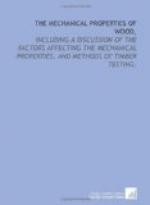Z l^{2}
(2) For beams (centre loading) n = ---------
6h
Z l^{2}
(3) For beams (third-pointloading) n = ---------
5.4h
Z = rate of fibre strain per inch
of fibre length.
l = span of beam or length of compression specimen.
h = height of beam.
The values commonly used for Z are as follows:
Bending large beams Z = 0.0007 Bending small beams Z = 0.0015 Endwise compression-large specimens Z = 0.0015 Endwise compression-small " Z = 0.003 Right-angled compression-large " Z = 0.007 Right-angled compression-small " Z = 0.015 Shearing parallel to the grain Z = 0.015
Example: At what speed should the crosshead move
to give the
required rate of fibre strain in testing a small beam
2” X 2” X
30”. (Span = 28".) Substituting these values
in equation (2)
above:
(0.0015
X 28^2)
n = -----------------
= 0.1 inch per minute.
(6
X 2)
In order that tests may be intelligently compared, it is important that account be taken of the speed at which the stress was applied. In determining the basis for a ratio between time and strength the rate of strain, which is controllable, and not the ratio of stress, which is circumstantial, should be used. In other words, the rate at which the movable head of the testing machine descends and not the rate of increase in the load is to be regulated. This ratio, to which the name speed-strength modulus has been given, may be expressed as a coefficient which, if multiplied into any proportional change in speed, will give the proportional change in strength. This ratio is derived from empirical curves. (See Table XVII.)
|------------------------------------------------------
-------------------------------------------------------------------------------------------------------------------------------------------|




